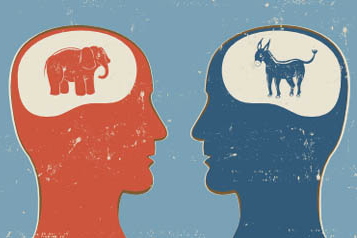Chapter 5: Contemporary Political Socialization THEMES IN POLITICAL SOCIALIZATION Political socialization performs a valuable function. It helps a society communicate its political heritage to new generations. We want children to understand the storied history of the United States, both its strengths and shortcomings. We want them to appreciate the importance of freedom, tolerance, and duty to country, as well as the importance of civic engagement. Other countries also convey their political lineage to young members of society, emphasizing distinctive national norms and values. Democratic societies in particular seek to nurture four virtues in citizens: knowledge of the political system; loyalty to democratic principles; adherence to traditions like voting; and identification with citizenship. Two themes weave their way through the socialization of political attitudes: continuity and change. STUDYING POLITICAL SOCIALIZATION You would not find as many children who harbored such uniformly positive attitudes today. On television and the Internet kids are […]
Media and Political Knowledge
Chapter 4: Media and Political Knowledge “A democracy can’t be strong if its citizenship is weak,” observed political scientist William A. Galston (2011). A key requirement for effective citizenship is knowledge. Meaningful democratic decision-making requires that citizens understand basic facts of government and the issues that are at stake in elections. National surveys show that most Americans know key aspects of the U.S. Constitution and civil liberties. Happily, they also know the number of senators from their state. But in a testament to widespread ignorance, just 35 percent know the names of both U.S. senators from their state, only a third can name all three branches of government, and 29 percent believe a person can be tried twice for the same crime. This underscores a time-honored paradox of political communication: There is more information available than ever before, yet citizens’ knowledge levels do not approach normative ideals (e.g., Neuman, 1986). […]
The Study of Political Communication ( review )
Chapter #3 : The Study of Political Communication (Review) The study of political communication is popularly believed to have begun with television, it actually dates back nearly a century. It was Walter Lippmann, the American journalist writing in the 1920s, who eloquently and influentially described the ability of the media to mold the images people carried in their heads about a distant world that was “out of reach, out of sight [and] out of mind.” EARLY HISTORY OF POLITICAL COMMUNICATION SCHOLARSHIP Back to Lippmann in the 1920s. After the war, Lippmann became disillusioned by the ways that Creel had used the powers of persuasion and coercion to influence the mass public. He rejected classic liberal democracy concepts, such as the power of rational thought or the ability of the press to relay accurate information. Instead, he concluded that people were prone to psychologically distort information and engage in stereotyping. “We […]
Political Communication
Chapter 2: Political Communication – Review is the process by which language and symbols, employed by leaders, media, or citizens, exert intended or unintended effects on the political cognitions, attitudes, or behaviors of individuals or on outcomes that bear on the public policy of a nation, state, or community. There are several aspects of the definition. Political communication is a process Political communication calls centrally on words and symbols (A symbol is a form of language in which one entity represents an idea or concept, conveying rich psychological and cultural meaning.) Group of leaders and Influence agents Political communication effects can be intended or unintended. Political communication is that effects occur on a variety of levels. ( Political media exert influence on the micro level, affecting individuals’ thoughts, candidate assessments, feelings, attitudes, and behavior.) CONTEMPORARY POLITICAL COMMUNICATION One view is that elite leaders exert a preeminent impact on opinions and […]
MPhil Mass Communication important eBooks
M Phil Mass Communication important eBooks Dear Students of M Phil Mass Communication , University of Gujrat, Pakistan. Students of M Phil Mass Communication have to explore a variety of subjects and topics. It is not possible to buy books for every topic so teachers have prepared notes and other helping study material for students on different topics. It is commonly quite difficult and hassle for lecturer to share notes as well as for students to get the notes and other study material. You will always find a huge students’ rush on photocopier shop to get notes. Now masscommunicationtalk.com has maintained almost all the notes and study material for M Phil Mass Communication students. You can explore all the notes and study material online here. You can explore already uploaded notes as well as you can add your own notes. If you have developed your own notes or you wanted to […]
HAROLD LASSWELL’S PROPAGANDA THEORY
Lasswell’s theory of propaganda blended ideas borrowed from behaviorism and Freudianism into a particularly pessimistic vision of media and their role in forging modern social orders. Lasswell was one of the first political scientists to recognize the usefulness of various psychological theories and to demonstrate how they could be applied to understanding politics. The power of propaganda was not so much the result of the substance or appeal of specific messages but, rather, the result of the vulnerable state of mind of average people. This state of mind can be assessed using psychological theories. Lasswell argued that economic depression and escalating political conflict had induced widespread psychosis, and this made most people susceptible to even crude forms of propaganda. When average people are confronted daily by powerful threats to their personal lives, they turn to propaganda for reassurance and a way to overcome the threat. In Lasswell’s view, democracy has […]
